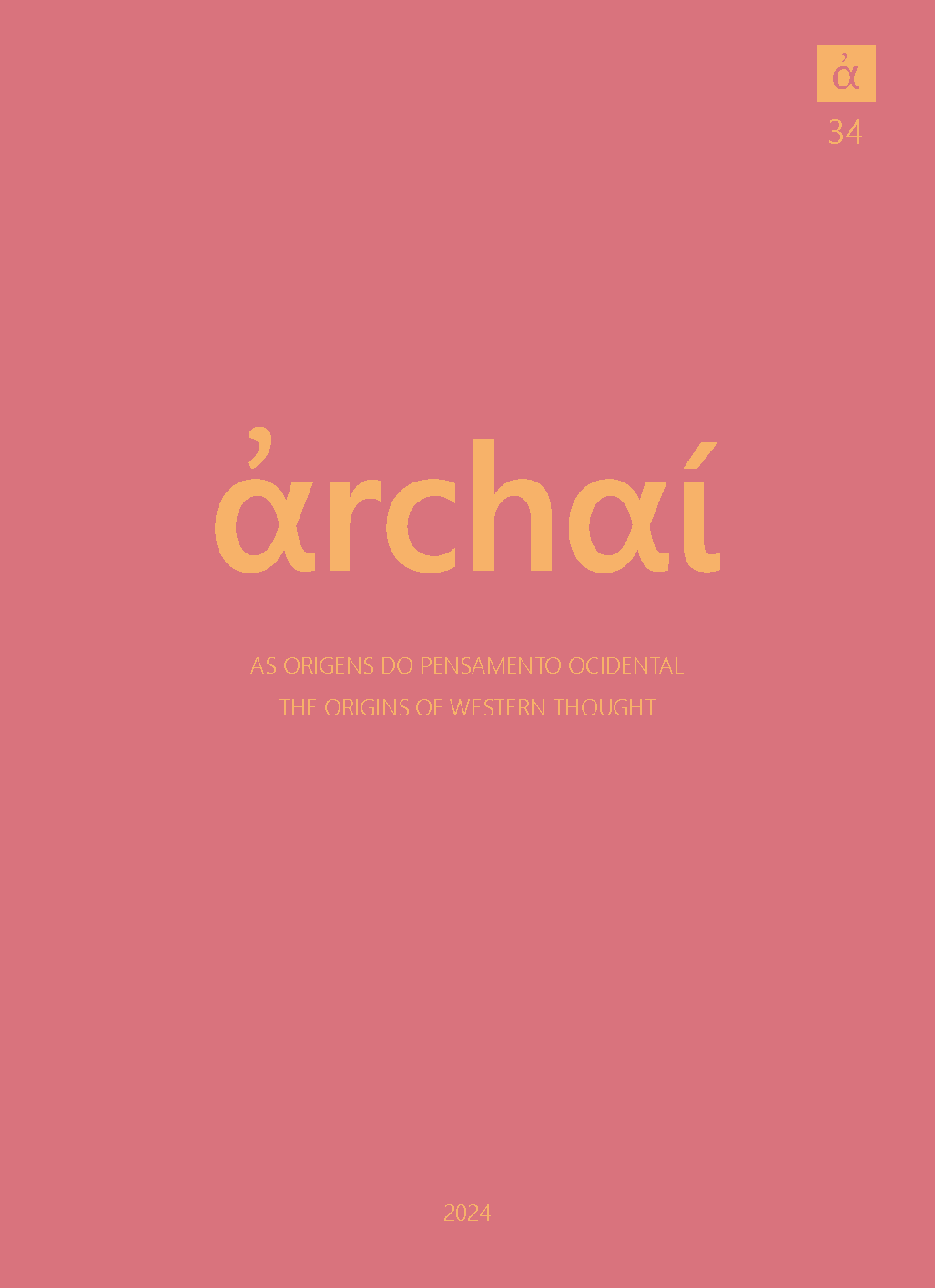Protagoras in the Theaetetus: arguments of "defence" and "self-refutation"
DOI:
https://doi.org/10.14195/1984-249X_34_14Keywords:
Plato, Protagoras, “Secret doctrines”, “Apology” and “Self-refutation” arguments, Palavras-chave: Platão; Protágoras; “doutrinas secretas”; argumentos da “Defesa” e da “Autorrefutação”; doxaAbstract
Is there an explanation for ‘Socrates’’ wavering attitude towards Protagoras, in the Theaetetus? It seems he praises him only to chide him, though always showing some measure of respect. Can such behaviour be justified by irony? What connection ties the sophist to his disciples’ “secret doctrines”? How can ‘Socrates’ attack the sophist with unfair criticisms, then defend his project as if he were the man himself, and finish accusing Protagoras’ “Truth” of being true to no one? This paper discusses these questions aiming to understand how can ‘Socrates’ sidestep ‘Protagoras’ without refuting him.
References
CAIZZI, F. D. (1978). Il frammento 1 D.-K. di Protagora. Annali della Facoltá di Lettere e Filosofia… di Milano 31, p. 30.
CORRADI, M. (2018). Protagorean Socrates, Socratic Protagoras: A Narrative Strategy from Aristophanes to Plato. In: STAVRU, A.; MOORE, C. (eds.). Socrates and the Socratic Dialogue Leiden/Boston, Brill, p. 85-104.
DIXSAUT, M. (2002). Natura e ruolo dell’anima nella sensazione. In: Il Teeteto di Platone: struttura e problematiche Napoli, Loffredo, p. 39-62.
FINE, G. (1998). Relativism and Self-Refutation. In: GENTZLER, J. (ed.). Method in Ancient Philosophy Oxford, Clarendon Press, p. 137-163.
GOMPERZ, T. (1933). Pensatori greci II Firenze, La Nuova Italia, p. 272-302.
LEE, M. K. (2011). The Theaetetus. In: FINE, G. (ed.). Oxford Handbook of Plato Oxford, Oxford University Press, p. 411-436.
LIMA, P. B. de (2004). Platão: Uma poética para a filosofia São Paulo, Perspectiva.
NAILS, D. (2002). The People of Plato: A Prosopography of Plato and Other Socratics Indianapolis/Cambridge, Hackett.
PLATÃO (2005). Teeteto Tradução de NOGUEIRA, A. M.; BOERI, M. Prefácio de SANTOS, J. T. Lisboa, Fundação Calouste Gulbenkian.
PLATO (1973). Theaetetus Translated with notes by John McDowell. Oxford, Clarendon Press .
PLATÓN (2006). Teeteto . Introducción, traducción y notas de MARCELO BOERI. Buenos Aires, Editorial Losada.
PLATON (1995). Théétète Traduction et présentation par NARCY, M. Paris, GF Flammarion.
PLATONIS OPERA I-V (1900-1903). Oxford Classical Texts Oxford, Oxford University Press .
SANTOS, J. T. (2021). Sensação e Saber não são o mesmo (Teeteto 186e). In: CORREIA, A.; RENAN, R.; RENNYER, W. (eds.). Pensamento & Realidade: Entre o alvorecer antigo e o crepúsculo moderno [recurso eletrônico] Porto Alegre, Editora Fi, p. 76-99.
SCHILLER, F. C. S. (1908). Plato or Protagoras? London, Blackwell.
SEXTUS EMPIRICUS I-IV (1923-1949). Loeb Classical Library Cambridge (Mass.), London, Harvard University Press.
UNTERSTEINER, M. (1954). The Sophists Oxford, Blackwell.
ZILIOLI, U. (2013). The Wooden Horse: The Cyrenaics in the Theaetetus In: BOYS-STONES, G.; EL MURR, D.; GILL, C. (eds). The Platonic Art of Philosophy Cambridge, Cambridge University Press, p. 167-185.
Downloads
Published
Issue
Section
License
Copyright (c) 2024 José Gabriel Trindade Santos

This work is licensed under a Creative Commons Attribution 4.0 International License.
Given the public access policy of the journal, the use of the published texts is free, with the obligation of recognizing the original authorship and the first publication in this journal. The authors of the published contributions are entirely and exclusively responsible for their contents.
1. The authors authorize the publication of the article in this journal.
2. The authors guarantee that the contribution is original, and take full responsibility for its content in case of impugnation by third parties.
3. The authors guarantee that the contribution is not under evaluation in another journal.
4. The authors keep the copyright and convey to the journal the right of first publication, the work being licensed under a Creative Commons Attribution License-BY.
5. The authors are allowed and stimulated to publicize and distribute their work on-line after the publication in the journal.
6. The authors of the approved works authorize the journal to distribute their content, after publication, for reproduction in content indexes, virtual libraries and similars.
7. The editors reserve the right to make adjustments to the text and to adequate the article to the editorial rules of the journal.



